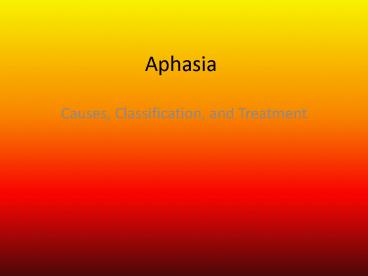Aphasia - PowerPoint PPT Presentation
1 / 14
Title:
Aphasia
Description:
Preserved ability to repeat. Impaired auditory comprehension. Conduction Aphasia. Extremely poor repetition ability. Naming deficit is mild to severe ... – PowerPoint PPT presentation
Number of Views:2288
Avg rating:3.0/5.0
Title: Aphasia
1
Aphasia
- Causes, Classification, and Treatment
2
Definition
- aphasia (uh-fay'-zhuh) According to the
National Aphasia Association, Aphasia is an
impairment of the ability to use or comprehend
words, usually acquired as a result of a stroke
or other brain injury (http//www.aphasia.org).
There are different types of aphasia depending on
the site of damage.
3
Causes
- The most common cause is a cerebral vascular
accident (CVA) - Damage to the perisylvian area of the left
hemisphere
4
Classification
- Non-fluent (expressive)
- Brocas
- Transcortical motor
- Global
- Fluent (receptive)
- Wernickes
- Transcortical sensory
- Conduction
- Anomic
5
Brocas Aphasia
- Damage to Brocas area
- Some deficits in all areas
- Severely impaired fluency
- Abnormal prosody
- Telegraphic speech
- Short phrase length
- Auditory comprehension deficits are mild to
moderate - Repetition deficit is mild to severe
- Naming deficit is mild to severe
6
Transcortical Motor
- Remarkably well-preserved repetition
- Conversational speech is severely impaired
- Auditory comprehension is mild-moderately
impaired - Naming deficit is mild to severe
- Difficulty initiating speech or writing
7
Global
- Most debilitating form of aphasia
- Severe deficits in all areas
- Limited expressive output
- Auditory comprehension deficits are severe
- Reading comprehension deficits are severe
8
Wernickes Aphasia
- Hyperfluent speech
- Auditory comprehension deficits
- Paraphasia
- semantic association (fork/spoon)
- clang associations (spood/spoon)
- Neologisms invented words
- Jargon streams of nonsense sounds
9
Transcortical Sensory
- Rarest of the fluent types
- Conversational speech abounds with paraphasia and
is lacking in nouns - Naming is moderately-severely impaired
- Preserved ability to repeat
- Impaired auditory comprehension
10
Conduction Aphasia
- Extremely poor repetition ability
- Naming deficit is mild to severe
- Auditory comprehension deficit is mild to
moderate - Conversational speech is fluent, good
articulation, syntax, and prosody
11
Anomic Aphasia
- Spontaneous speech is fluent, good articulation,
syntax, and prosody - Mild-moderate impairment of auditory
comprehension - Significant difficulty with confrontation naming
12
Treatment for Aphasia
- General information
- Treatment benefits are greater for Brocas
aphasia than for fluent types of aphasia - Benefits are greater if a single-stroke etiology
- Benefits are greater in younger patients
- Frequent sessions are better than sporadic during
first 6 months
13
Treatment orientations
- Stimulation-facilitation
- Intensive, repeated stimulation (primarily
auditory) to facilitate damaged areas recovery - Deblocking
- Intact systems used to help deblock damaged
areas - Operant conditioning
- Loss of knowledge demands relearning
- Functional/compensatory
14
Specific procedures
- Stimulation-facilitation review of Brubaker
- Ameri-Ind AAC or facilitative approach
- Visual Action Therapy
- Promoting Aphasics Communicative Effectiveness
(PACE) functional approach - Melodic Intonation Therapy Estabrooks video































![[PDF] Speech Therapy Aphasia Rehabilitation *STAR* Workbook IV: Activities of Daily Living for: Attention, Cognition, Memory and Problem Solving Paperback – December 30, 2014 Ipad PowerPoint PPT Presentation](https://s3.amazonaws.com/images.powershow.com/10100111.th0.jpg?_=20240816056)